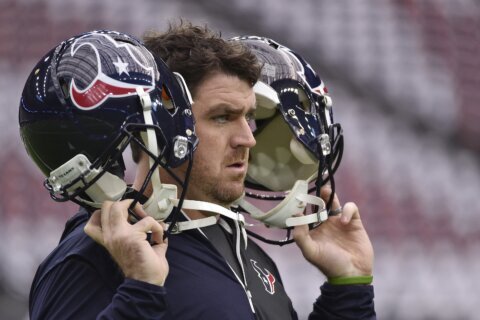Turning more bowls into playoff games would give more players a worthy reward for risking millions in potential future earnings to participate in the postseason.
Players opting out of bowl games became the underlying theme of New Year’s Day in college football, which was a shame because the games themselves were entertaining — even with some missing All-Americans.
Oklahoma State’s Fiesta Bowl comeback against Notre Dame was thrilling. The Rose Bowl between Ohio State and Utah was epic. Still, it was hard to watch them without wondering how much better it would if these teams were playing with a chance to win a national championship.
While Friday’s Orange and Cotton bowl blowouts could lead some to suggest that a four-team playoff is more than enough to determine the best team in the country, that’s not the point of expansion.
The 12-team playoff proposal that conference commissioners will try to push across the goal line next weekend Indianapolis — a day before Alabama and Georgia meet for the national title on Jan. 10 — is designed to create more high-stakes postseason games that will get players, coaches and fans more invested in their outcomes.
In the eight-year history of the College Football Playoff, no prominent player has ever opted out of a semifinal.
That fact eluded ESPN’s Kirk Herbstreit when he started a daylong take-fest on Twitter with an oh-these-kids-today rant on “College GameDay.”
“I just don’t understand if you don’t make it to the playoff, how is it ‘meaningless’ to play football,” Herbstreit said Saturday. “Isn’t that what we do as football players, is we compete? I don’t know that expanding it is changing anything. I really don’t.”
He added: “I think this era of player just doesn’t love football.”
It was a tone-deaf statement by Herbstreit, insisting a new generation hold the same sentimentality for traditions that he has — even though those traditions have been watered down for years by the adults who run college football.
The enterprise has become a millionaire-making business for coaches, administrators and celebrity commentators, but the players are held to different standards.
A coach bolts to a new school for a $100 million deal, but the players are expected to stick it out to the end for love of the game and loyalty to teammates.
As expected, social media scorched Herbstreit, the former Ohio State quarterback who has become the most-high profile member of college football media. He eventually walked back his comments, conceding he painted with too broad a brush.
Notre Dame star safety Kyle Hamilton, a likely first-round NFL draft pick who decided not to play in the Fiesta Bowl, posed this question on Twitter:
“Another sports broadcast offers you the opportunity to make ‘X’ amount of dollars that would help you and your family in ways you couldn’t in the past, but there’s a possibility that you don’t get the job if you film another College Gameday. What would you do?” Hamilton tweeted.
There is more nuance to it, but that broadly sums up the decision these players face.
An injury in a bowl game, even one that isn’t career-threatening, can complicate the next fourth months of evaluation and drastically change the trajectory of a player’s professional career.
The risk/reward calculation for unpaid college players understandably leads many to pass on one last moment of collegiate glory.
Plenty of players still choose to play.
The most prominent of those on New Year’s Day was Mississippi quarterback Matt Corral, a potential first-round pick who decided to suit up for the Sugar Bowl against Big 12 champion Baylor. The Rebels and Bears are two more teams that would have been in a 12-team field if that system was in place.
Corral deciding to play was understandably the story of the game and ESPN’s broadcast crew of Joe Tessitore and Greg McElroy gushed with praise for the junior — who was then injured in the first quarter.
Corral watched the second half from the sideline on crutches, rooting on his teammates and encouraging his replacement in Baylor’s 21-7 victory.
Corral’s actions were admirable and it was relieving to hear from Coach Lane Kiffin after the game that X-rays on the quarterback’s ankle showed no broken bones.
But at some point, praising Corral and others who choose to play turns into scolding those who don’t.
“He’s doing it the right way,” Tessitore said about Corral. “He cares about it the right way.”
So others are going about it the wrong way?
Expanding the playoff doesn’t end opt-outs. There would still be far more bowls than playoff games. Ideally, playoff expansion will be part of reimagining the entire postseason, and maybe even regular season in college football.
How about bowls to start the season?
Players still love to play, but more and more they want stakes beyond pride and tradition attached to put their futures at risk.
So give more of them a chance to play for a national title as the reward.
___
Follow Ralph D. Russo at https://twitter.com/ralphDrussoAP and listen at http://www.appodcasts.com
___
More AP college football: https://apnews.com/hub/college-football and https://twitter.com/AP_Top25. Sign up for the AP’s college football newsletter: https://apnews.com/cfbtop25
Copyright © 2024 The Associated Press. All rights reserved. This material may not be published, broadcast, written or redistributed.







